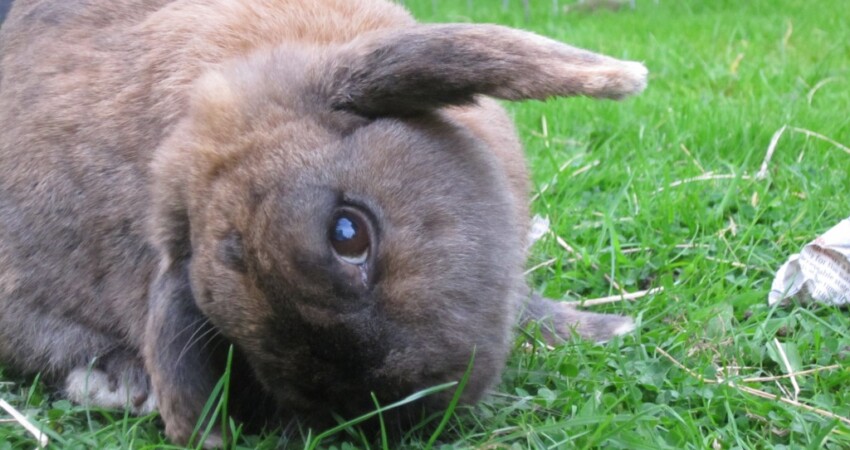

Recognizing when your rabbit is lonely, distressed, or sick can be tough, but doing so is crucial to their survival. No farmer would like to loose an animal to disease especially in their watch. Rabbits can’t advocate for themselves, they need your awareness and your support. If your Rabbits exhibit the following , then your Rabbits are sick.
1. Stasis
Any longtime rabbit farmer has likely dealt with Statis. It’s one of the most common illnesses that affects rabbits. Symptoms vary, but rabbits who suffer from stasis usually are lethargic or are unable to get comfortable because of gas or cramping. Thankfully, it’s also one of the easiest conditions to treat if it’s caught early on, but it can be fatal if it isn’t treated quickly. Digestive issues, stress, and tooth problems are just a few things that can cause stasis. Talk to your veterinarian about getting the necessary emergency supplies to treat stasis at home in case you need to help your rabbit before you can get them to your vet’s office.
2. Sore Hocks
When the sole of a rabbit’s foot becomes raw and inflamed, this is called sore hock, and there’s usually one main culprit: unsuitable flooring. Wire cages are often to blame and should never be used for rabbits’ housing, they don’t sufficiently support rabbits’ weight and can cause their feet to bow. Flooring made of wood, tile, or linoleum (anything that’s slick) is also not ideal. To avoid sore hocks and other foot problems, provide your rabbit with soft, flexible flooring that will mimic the natural feel of the earth. Obesity, arthritis, and other health conditions can also cause sore hocks. A veterinarian should treat sore hocks, and address the cause of the problem, immediately.
3. Head Tilt
Also known as torticollis or wry neck, a head tilt can be triggered by a number of things. According to researchers, a stroke, protozoan infection, an ear infection, cancer, intoxication, and trauma can all cause head tilt in rabbits. The good news is that with proper treatment, many rabbits with head tilt can go on to lead perfectly happy lives. But whether it can be completely fixed can only be determined by a veterinarian. If your rabbit is showing signs of a head tilt, take them to the vet right away.
4. Difficulty Breathing
If your rabbit has the “snuffles,” don’t make the mistake of writing it off as a cold. Rabbits don’t catch human colds. If your rabbit is sneezing or has a runny nose or runny eyes (especially if the discharge is white in color and gelled), they may be suffering from an upper respiratory infection and need to be seen by a veterinarian right away. If your rabbit exhibits raspy or heavy breathing or if they lift their nose high in the air to breathe, they may have a lower respiratory infection, a critical illness that requires immediate expert care.
5. Flystrike
Flystrike, also known as myiasis, should never be ignored with any animal. It’s a maddening and painful condition in which flies bite rabbits until they’re bloody and then lay eggs in the wounds, producing maggots who eat away at the dead tissue. The condition is preventable with proper care, always remember that an ounce of prevention is worth a pound of cure.
To prevent flystrike, rabbits should be kept indoors. (Although it’s possible for indoor rabbits to get flystrike, it mostly affects rabbits who live outdoors.) Their living area should always be kept clean. Clean and dry any area in which your rabbit urinates or defecates, and be sure to remove and replace dirty litter or bedding. Check your rabbit’s skin at least daily (and more frequently if the weather is hot) for signs of skin irritation or wounds. If you suspect that your rabbit is at risk of getting flystrike or they have difficulty urinating or produce unusually wet feces, take them to the vet immediately. If not treated quickly, the condition could be fatal. If your rabbit is prone to flystrike, ask your vet about products that you can keep at home to help prevent it.
6. Hairballs
Hairballs are not just a cat thing. Rabbits can accumulate hairballs in their stomach, which can cause a digestive condition known as gastrointestinal stasis. It’s natural for rabbits to ingest hair while grooming themselves, and if they’re fed a proper high-fiber diet (with unlimited, good-quality hay), the hair goes through their digestive tract easily. But without proper nutrition to aid in digestion, such as a diet without enough fiber, matted hair may collect in their stomach, leading to gastrointestinal stasis. Regularly brushing rabbits can help prevent this. Ask your veterinarian how often you should groom your rabbit.
 Contact Jaguza Support
Contact Jaguza Support